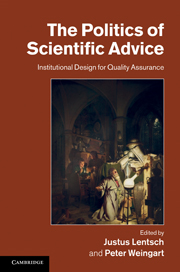Book contents
- Frontmatter
- Contents
- List of figures
- List of tables
- Acknowledgements
- Biographical notes
- Part I Methodological issues: quality control and assurance in scientific policy advice
- Part II Collegial science advisory bodies
- Part III Collegial science policy advisory bodies
- Part IV Research-based advisory organisations
- Part V Academies of science
- 17 Scientific advice for policy in the United States: lessons from the National Academies and the Former Congressional Office of Technology Assessment
- 18 Quality control in scientific policy advice: the experience of the Royal Society
- 19 European Academies Science Advisory Council (EASAC)
- 20 Quality control in the advisory process: towards an institutional design for robust science advice
- Index
- References
20 - Quality control in the advisory process: towards an institutional design for robust science advice
Published online by Cambridge University Press: 25 October 2011
- Frontmatter
- Contents
- List of figures
- List of tables
- Acknowledgements
- Biographical notes
- Part I Methodological issues: quality control and assurance in scientific policy advice
- Part II Collegial science advisory bodies
- Part III Collegial science policy advisory bodies
- Part IV Research-based advisory organisations
- Part V Academies of science
- 17 Scientific advice for policy in the United States: lessons from the National Academies and the Former Congressional Office of Technology Assessment
- 18 Quality control in scientific policy advice: the experience of the Royal Society
- 19 European Academies Science Advisory Council (EASAC)
- 20 Quality control in the advisory process: towards an institutional design for robust science advice
- Index
- References
Summary
Introduction: towards an organisational approach to science advising
In order to improve the quality of science advising and make a claim about appropriate institutional design, we first will have to understand the meaning of science advice and how it is actually practised. In the following we will derive a few very general lessons to be learned from the case narratives assembled in this book.
We started with the contention that the business of science advising has developed into a professional domain of its own. This runs contrary to a still widely shared assumption, that scientific advising is nothing else than the application of scientific knowledge to public policy problems. According to this view, there is a ‘fully objective, independent and impartial domain of technoscience that experts can tap into’ – the only challenge being to ensure that they do so with integrity (Wynne et al. 2007: 77). In fact, the relationship to the academic domain is quite complex and has to be carefully managed. The provision of a particular kind of expertise-based services or ‘serviceable truths’ is constitutive for the professional domain of science advising (Jasanoff 1990). Following Jasanoff, activities and outputs of scientific advisory organisations must not be conflated with academic science and its products (such as scientific publications). In fact, it is expertise – not science proper – that informs regulation and policymaking, i.e. the ability to generate, synthesise, transform and assess knowledge pertaining to particular policy problems – independently from whether it is of interest to the scientific community.
- Type
- Chapter
- Information
- The Politics of Scientific AdviceInstitutional Design for Quality Assurance, pp. 353 - 374Publisher: Cambridge University PressPrint publication year: 2011
References
- 18
- Cited by



